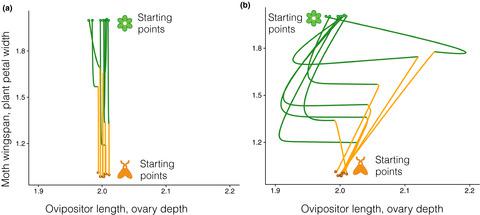当前位置:
X-MOL 学术
›
Ecol. Lett.
›
论文详情
Our official English website, www.x-mol.net, welcomes your
feedback! (Note: you will need to create a separate account there.)
Genetic correlations and ecological networks shape coevolving mutualisms.
Ecology Letters ( IF 7.6 ) Pub Date : 2020-09-24 , DOI: 10.1111/ele.13605 Ana Paula A Assis 1 , John N Thompson 2 , Pamela Cristina Santana 1 , Pedro Jordano 3 , Jordi Bascompte 4 , Paulo R Guimarães 1
Ecology Letters ( IF 7.6 ) Pub Date : 2020-09-24 , DOI: 10.1111/ele.13605 Ana Paula A Assis 1 , John N Thompson 2 , Pamela Cristina Santana 1 , Pedro Jordano 3 , Jordi Bascompte 4 , Paulo R Guimarães 1
Affiliation

|
Ecological interactions shape the evolution of multiple species traits in populations. These traits are often linked to each other through genetic correlations, affecting how each trait evolves through selection imposed by interacting partners. Here, we integrate quantitative genetics, coevolutionary theory and network science to explore how trait correlations affect the coevolution of mutualistic species not only in pairs of species but also in species‐rich networks across space. We show that genetic correlations may determine the pace of coevolutionary change, affect species abundances and fuel divergence among populations of the same species. However, this trait divergence promoted by genetic correlations is partially buffered by the nested structure of species‐rich mutualisms. Our study, therefore, highlights how coevolution and its ecological consequences may result from conflicting processes at different levels of organisation, ranging from genes to communities.
中文翻译:

遗传相关性和生态网络塑造了不断发展的共生关系。
生态相互作用决定了种群中多种物种特征的演变。这些性状通常通过遗传相关性相互联系,从而影响每个性状如何通过相互作用伙伴的选择而进化。在这里,我们将定量遗传学,协同进化理论和网络科学相结合,以探索性状相关性如何不仅影响成对物种而且还影响跨空间物种丰富的网络对互惠物种的协同进化。我们表明,遗传相关性可能决定同进化的步伐,影响物种丰富度和同一物种种群之间的燃料分化。但是,遗传相关性促进的这种性状差异部分被物种丰富的共生关系的嵌套结构所部分缓冲。因此,我们的研究
更新日期:2020-11-12
中文翻译:

遗传相关性和生态网络塑造了不断发展的共生关系。
生态相互作用决定了种群中多种物种特征的演变。这些性状通常通过遗传相关性相互联系,从而影响每个性状如何通过相互作用伙伴的选择而进化。在这里,我们将定量遗传学,协同进化理论和网络科学相结合,以探索性状相关性如何不仅影响成对物种而且还影响跨空间物种丰富的网络对互惠物种的协同进化。我们表明,遗传相关性可能决定同进化的步伐,影响物种丰富度和同一物种种群之间的燃料分化。但是,遗传相关性促进的这种性状差异部分被物种丰富的共生关系的嵌套结构所部分缓冲。因此,我们的研究











































 京公网安备 11010802027423号
京公网安备 11010802027423号